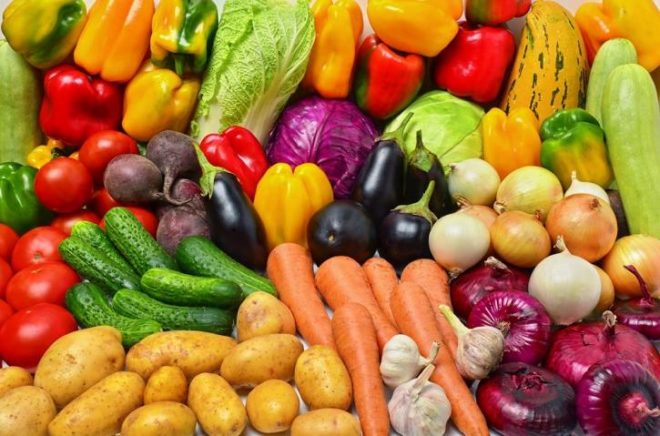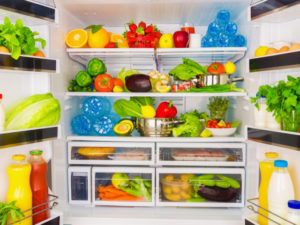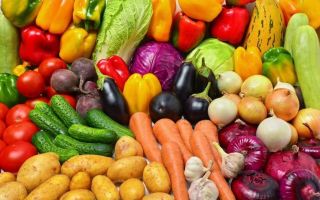Content
Vegetables are an irreplaceable product in the diet of any person. They are valued for their excellent taste and nutritional characteristics, therapeutic and prophylactic effects on the body. The beneficial properties of the fruit have found their application in cooking and food industry, in medicine and cosmetology. The benefits and harms of vegetables, however, depend on the individual cases of their use.

How vegetables are useful
The benefits of vegetables for the human body are enormous: they play a decisive role in maintaining human health and life. The beneficial properties of a vegetable diet are manifested in the treatment and prevention of many diseases, in neutralizing the harm from taking medicines, fatty and high-calorie foods, and in many other things.
Nervous system
Vegetables contain chemical elements that have useful properties for the proper functioning of the nervous system: B-group vitamins, magnesium, Omega-3, and others. Folic acid and selenium help to produce endorphins, which give a person a feeling of joy and happiness.
Energy
Vegetables are well and quickly assimilated without high energy costs. The fruits contain an excess of water, they are simultaneously able to quench both hunger and thirst. If you eat vegetables for breakfast, the benefits will be expressed in a charge of vigor for the whole day.
Source of vitamins
The medicinal properties of vegetables are explained by a large set of vital chemical elements. Biologically active compounds are fully assimilated, unlike synthetic analogs. Therefore, herbal food cannot be replaced by any pharmaceutical preparations. In addition, synthetic vitamin and mineral complexes can harm the body and worsen health.
Weight loss
Plants contain a lot of fiber. Its benefit is in influencing the formation of the internal environment of the intestine, while it is not absorbed and has no energy value. Dietary fiber swells in the stomach and creates a feeling of fullness for a long time, which does not give rise to overeating. Fiber cleanses the body:
- from cholesterol;
- slags;
- toxins;
- carcinogens.
Due to the low calorie content, vegetables can be eaten at will in any quantity, and this will in no way affect the figure.
Rejuvenation
Antioxidants are useful chemical compounds, the properties of which help cells to recover and renew themselves, prevent the harmful effects of free radicals on them. The role of antioxidants is played by flavonoids, anthocyanins, tannins, some trace elements (for example, selenium), nicotinic acid, and others.
Mental activity
The beneficial elements contained in plant products help to keep blood vessels clean, make them elastic, not subject to harm and destructive influence of external factors.This helps to keep the mind clear until old age, the memory - sharp, and also to avoid such serious diseases as atherosclerosis, thrombosis, and others.
Immunity
The healing properties of vegetables, their rich nutritional composition help to strengthen the body's defenses, resist diseases, including such complex ones as cancer and diabetes. First of all, fruits of bright saturated colors are used for this purpose. Studies have shown that they have more of the beneficial properties needed to increase the body's protective barrier. Chlorophyll in greens also targets specific cells of the immune system that are the first line of defense (intraepithelial lymphocytes).

What are the healthiest vegetables
The selection of vegetables is quite rich. Therefore, it is important to know about their properties and already based on this, make up your diet. The list of the most useful:
- Tomatoes: rich in the antioxidant lycopene, which has a therapeutic and prophylactic effect on cancer, vascular inflammation, atherosclerosis, and other pathologies. They contain the most vitamin A, which gives protection against free radicals - the main harm factor for the development of oncological diseases;
- Broccoli: contains the substance sulforaphane, which can kill H. pylori, thereby protecting the stomach from ulcers and gastritis, as well as preventing the development of cancer cells. The vegetable is rich in nutrients that strengthen the immune system (carotenoids, ascorbic acid, folates);
- Brussels sprouts: contains a high concentration of folic acid, which is especially beneficial for pregnant women, as well as B-group vitamins. Omega-3 properties help to rejuvenate the skin and improve brain activity;
- Carrot: is a source of antioxidants, as well as vitamin A, the beneficial properties of which help to improve appearance, vision;
- Pumpkin: contains significant amounts of magnesium, potassium, therefore it is necessary for the heart. The high fiber content helps to eliminate cholesterol, which serves as a good prevention of atherosclerosis. The vegetable improves the condition of the skin, slows down graying of hair, and is also good for eyesight, with liver diseases;
- Sweet potato, or sweet potatoes: it contains iron, vitamins A, C, which makes the fruit an important component of the vegetarian menu;
- Eggplant: removes cholesterol, excess fluid, and also, due to the high content of potassium, fiber, ensure full heart function;
- Sweet peppers: it contains the most ascorbic and folic acids, antioxidants, and other elements. Red varieties are more useful: chromium in their composition protects the body from diabetes, lycopene - from cancer, and dietary fiber - from atherosclerosis;
- Spinach: contains almost all essential nutrients. It has a good effect on the functioning of the digestive tract, salivary and pancreas, strengthens visual function;
- Onion: useful for osteoporosis, improves calcium absorption. It has a therapeutic and prophylactic effect in diabetes, vascular pathologies.
Other vegetables also have an impressive supply of health benefits. Each of them contributes to the health of the human body.
How many vegetables can you eat per day
Scientists advise introducing as many vegetables and fruits as possible into the diet. They even give exact figures: 5 servings of 80 g each day. At the fast pace of modern life, it is unlikely that it will be possible to follow this pattern exactly. But still, the diet should consist of more than half of vegetables, herbs, fruits.

What vegetables can you eat when losing weight
Vegetables are an indispensable tool for those who want to lose weight.They are generally low in calories, high in fiber, and packed with healthy nutrients. Losing weight needs to eat the following foods:
- Eggplant: one of the lowest calorie vegetables (24 kcal), while producing a sustained feeling of fullness. Its harm is manifested in the properties of quickly absorbing fat, so it cannot be fried;
- White cabbage: contains elements that accelerate the breakdown of fats. For weight loss, all types of cabbage have useful properties;
- Leafy greens: contains chlorophyll, which suppresses appetite;
- Cucumbers: they contain a large percentage of water, have a low calorie content, a diuretic effect;
- Tomatoes: help to better assimilate food, reduce the load on the digestive tract;
- Pepper: contains phytosterols that regulate fat metabolism;
- Beans: Protein source that can replace meat and promote fluid loss.
Any vegetable dishes prepared in a gentle way and without added fat are indicated during weight loss. Such food will give a feeling of satiety, saturate with useful properties, neutralize the harm from the intake of low-quality products and from the consequences of environmental exposure.

How to eat vegetables correctly
The benefits of fresh vegetables eaten raw are well known. In this form, all biologically active compounds are preserved, which not only provide nutrition to the cells and tissues of the body, but also act on it like effective drugs. For therapeutic and prophylactic purposes, it is better to eat raw foods on an empty stomach, 0.5 - 1 hour before meals: during this time, useful elements will be absorbed and show their healing properties.
However, not everyone and not always can eat raw food: they can harm children, patients with chronic gastrointestinal pathologies. However, heat treatment should be as gentle as possible, no more than that which preserves the benefits of boiled vegetables. Valuable nutrients begin to break down even at relatively low heat - +40 oC, and during the high-temperature processing, only a small part of them remains in the food.
In what form are vegetables healthier
Most plant foods retain and transfer their beneficial properties in their raw form. Some of the chemical compounds begin to break down already at +50 oC. Therefore, a very gentle culinary treatment must be used to preserve them. If it is not possible to do without heat treatment, the method of steaming vegetables will be beneficial.
For example, boiled carrots absorb several times more carotenoids and antioxidants. Raw foods can be dangerous for children. Fiber has a detrimental effect on the fragile pancreas.

Stewed and boiled
The benefits and harms of stewed vegetables are somewhat different from thermally unprocessed foods. Raw plant food contains more vitamins, but the remaining substances are better and more fully absorbed from boiled and stewed dishes. For example, tomatoes that have undergone temperature exposure are healthier than their raw counterparts. Heat treatment enhances the health benefits of steamed vegetables by improving the absorption of lycopene and red pigments, powerful antioxidants that neutralize free radical damage.
Baked
Eggplants or zucchini are best baked in the oven. The concentration of potassium in them will increase, and nitrites and other harm will go away along with the liquid flowing into the pan. Baked potatoes also show their beneficial properties to the maximum.
The benefits of baked vegetables are significant. Raw foodists often have an excess of strontium in their bodies. And this is fraught with the displacement of calcium and magnesium. As a result, the risk of harm to the development of osteoporosis increases. Eating baked vegetables can solve this problem.
Dried
Vegetables are high in liquid. By removing it, you can significantly extend their shelf life. When dry, they are lighter, take up little space, and are easy to transport. The benefits of dried vegetables are their high concentration of nutrients.

How to store vegetables properly
There is no one rule for all vegetables. Each product requires its own individual approach. Mostly cool, dark places are suitable for storing vegetables:
- fridge;
- cellar;
- pantry;
- garage;
- basement.
Vegetable crops can also be frozen, preserved, thereby preserving their useful properties for a long time.
Are vegetables harmful?
Vegetables can be harmful if the individual characteristics of the person using them are not taken into account. For example, such a useful vegetable as white cabbage is contraindicated in case of increased gastric secretion, since it has the property of stimulating the secretion of digestive juices. It should not be used for pancreatitis either.
When growing vegetables, various chemical fertilizers are used, which from the soil enter the cells of the plant and then harm human health. The surface can be treated for better preservation during long transportation.

Conclusion
Understanding the benefits and harms of vegetables is necessary when forming a daily diet. When used correctly, taking into account individual contraindications, they serve as an indispensable source of intake of vital substances for a person.

